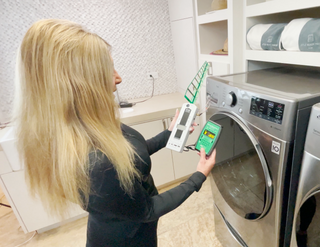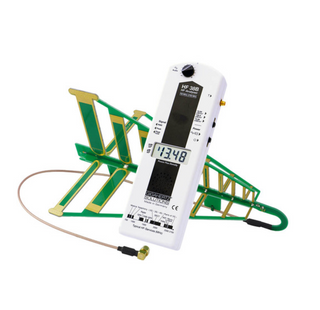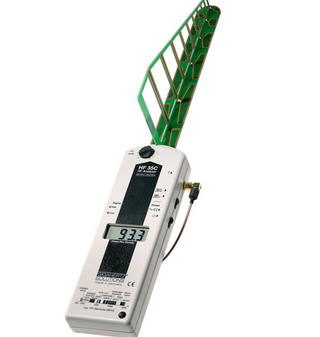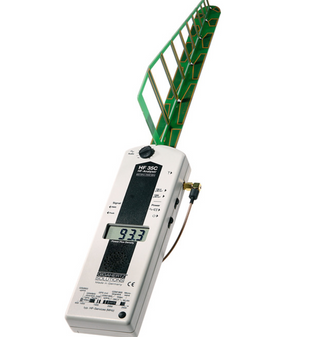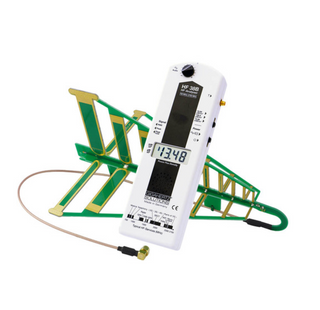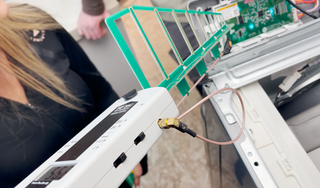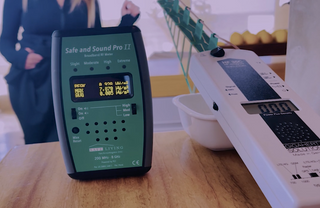Product Description
The Big Green Arrow Detects Hidden WiFi And Wireless in Smart Appliances Ships FREE
The big green arrow antenna on this wireless RF EMF meterlooks so pro! Right?! Thats because it is. No doubt you've seen my videos and others using one of the HF3-series RF EMF detectors and thought, well that looks cool.
These wireless energy radio frequencyEMF meters are definitely cool. I have one of each of what I like to call the Gigahertz Solutions Directional Meters because they allow me to "laser in" to the EMF. I used the less expensive HF35C in my How Shielded Clothing Works video and in our Find the Washer and Dryer WiFi video. And the more sensitive HF38B in our Airtag video
Serious about Finding Hidden Wireless Energy From Smart Appliances or Airtags?
Both the HF3's--The 35C And 38B Directional Antenna RF EMF Meters Are Point , Power On And Detect!
I love these because they have Complex RF Detection Capabilities yet are still really pretty easy to use to pinpoint the source and amount of wireless EMF
Designed to Meet Bau-Biologie RF Measurement Performance Requirements.
These are the kind of meters the Building Biologists use to ascertain and then verify how they've mitigated EMF radiation.
You'll enjoy using either of these RF EMF meters- the HF35C and the HF38B to Detect RF radiation from cellular phones and cordless phones (Digital or DECT); microwave ovens; wireless communication devices such as internet routers, WLAN, Wi-Fi, baby monitors, Bluetooth, video games, smart meters and cell phone towers.
You'll Find these great features in Both The HF35C And The HF38B Meters
-
Calibration:During the manufacturing process strict calibration procedures are followed using only high end, calibrated measurement instruments. This guarantees that everymeter made by Gigahertz has been individually calibrated to a traceable standard. LOVE THIS!
- Audio Identification: The meter's audio tone replicates the signal patterns and intensity of measured RF emissions and aids in source identification
- Accessorized with a sturdy Logarithmic–Periodic Antenna, designed for directional detection of RF waves. Readings increase when the meter gets closer to or points in the direction of offending sources
- Detects both analogue signals and pulsed digital signals
- Detects RF radiation generated by cellular phones and cordless phones (Digital or DECT)
- Easy to operate, power the unit on, selecting measurement settings and recording the LCD displayed readings as you walk the meter through your living space
- Accuracy/Linearity Deviation: +/- 6dB
- Audible Tone: The meter’s audio tone replicates the patterns and intensity of measured RF emissions
- Power Supply: 9 Volt alkaline battery included
- Battery Low Indicator: Meter will auto–power off 3 minutes following battery low signal display
- Auto Power Off: Saves on battery use – will auto–power off after 40 min of continuous EMF testing
- Operating Time: Alkaline battery provides up to 6–7 hrs continuous EMF testing
- Users' Guide
- 2 Year Warranty Certificate
The Features That Are Different In Each Meter
HF35C is the less expensive meter, priced at $399.00
-
Logarithmic Periodic Antenna 800 MHz – 2.7 GHz vertically polarized
- Antenna Directional Logarithmic Periodic “LogPer” 800 MHz – 3.0 GHz 45º
- Peak Settings and Average Settings: While measurements taken on the Average Value setting provide a basic sense of RF levels at a test site, the Peak Value setting reveals the highest levels of RF being emitted. The Peak Value is regarded as the measurement critical to assessing potential biological effects
- A Coarse measurement range and Fine measurement range provide added value when needing to assess RF emissions
- Coarse range covers stronger readings of 1 - 1999 µW/m²
- Fine measurement range of 0.1 - 199.9 µW/m² offers higher sensitivity and allows for accurate detection of lower level signals
The HF38B RF Meter Offers A Greater Spectrum Range To Detect Going Past the 3.0 GHZ to 3.3 GHZ and 10 Times the Measurement Sensitivity Of The Less Expensive HF35C.
My Favorite UPGRADE of the HF38B RF Meter Is The Ability to HOLD The Peak Measurement -
It's a great feature because it Makes It Easy to Compare Measurements--plus Peak Hold lets you get an accurate assessment of sources that emit strong, quick bursts of RF energy like smart meters do.
HF38B costs more and is priced at $525.00 Here are the upgraded features if you need them- in BOLD
- Logarithmic Periodic Antenna 700 MHz – 3.3 GHz vertically polarized
- Antenna: Directional Logarithmic Periodic “LogPer” 700 MHz – 3.3 GHz 45º
- Offers a Coarse measurement range, Medium measurement range and a Fine measurement range
- Coarse range covers stronger readings of 0.01 - 19.99 mW/m²
- Measuring Range (700 MHz – 3.3 GHz)
- Audio Signal Analysis, 10 times more sensitive than the HF35C
- Peak Hold, Peak and Average Settings: While measurements taken onthe Average Value setting provide a basic sense of RF levels at a test site,the Peak Value setting reveals the highest levels of RF being emitted. The PeakValue is regarded as the measurement critical to assessing potential biological effects
- Peak Hold Settings, Peak Settings and Average Settings, can measure higher power signals.
- Measuring Ranges: 0.01 –19.99 µW/m² // 0.1 – 199 µW/m² // 0.01 – 19.99 mW/m².
- Maximum display resolution is 1,999,000 µW/m² which requires the external DG20 Attenuator
What do EMF measurements mean? What are the safety concerns of EMF? For more information about all things EMF, please see our guide
3Scroll down to learn more about EMF/RF energy and watch a great video.
SEE ALL OF OUR EMF METERS!
Product Description
The Big Green Arrow Detects Hidden WiFi And Wireless in Smart Appliances Ships FREE
The big green arrow antenna on this wireless RF EMF meterlooks so pro! Right?! Thats because it is. No doubt you've seen my videos and others using one of the HF3-series RF EMF detectors and thought, well that looks cool.
These wireless energy radio frequencyEMF meters are definitely cool. I have one of each of what I like to call the Gigahertz Solutions Directional Meters because they allow me to "laser in" to the EMF. I used the less expensive HF35C in my How Shielded Clothing Works video and in our Find the Washer and Dryer WiFi video. And the more sensitive HF38B in our Airtag video
Serious about Finding Hidden Wireless Energy From Smart Appliances or Airtags?
Both the HF3's--The 35C And 38B Directional Antenna RF EMF Meters Are Point , Power On And Detect!
I love these because they have Complex RF Detection Capabilities yet are still really pretty easy to use to pinpoint the source and amount of wireless EMF
Designed to Meet Bau-Biologie RF Measurement Performance Requirements.
These are the kind of meters the Building Biologists use to ascertain and then verify how they've mitigated EMF radiation.
You'll enjoy using either of these RF EMF meters- the HF35C and the HF38B to Detect RF radiation from cellular phones and cordless phones (Digital or DECT); microwave ovens; wireless communication devices such as internet routers, WLAN, Wi-Fi, baby monitors, Bluetooth, video games, smart meters and cell phone towers.
You'll Find these great features in Both The HF35C And The HF38B Meters
-
Calibration:During the manufacturing process strict calibration procedures are followed using only high end, calibrated measurement instruments. This guarantees that everymeter made by Gigahertz has been individually calibrated to a traceable standard. LOVE THIS!
- Audio Identification: The meter's audio tone replicates the signal patterns and intensity of measured RF emissions and aids in source identification
- Accessorized with a sturdy Logarithmic–Periodic Antenna, designed for directional detection of RF waves. Readings increase when the meter gets closer to or points in the direction of offending sources
- Detects both analogue signals and pulsed digital signals
- Detects RF radiation generated by cellular phones and cordless phones (Digital or DECT)
- Easy to operate, power the unit on, selecting measurement settings and recording the LCD displayed readings as you walk the meter through your living space
- Accuracy/Linearity Deviation: +/- 6dB
- Audible Tone: The meter’s audio tone replicates the patterns and intensity of measured RF emissions
- Power Supply: 9 Volt alkaline battery included
- Battery Low Indicator: Meter will auto–power off 3 minutes following battery low signal display
- Auto Power Off: Saves on battery use – will auto–power off after 40 min of continuous EMF testing
- Operating Time: Alkaline battery provides up to 6–7 hrs continuous EMF testing
- Users' Guide
- 2 Year Warranty Certificate
The Features That Are Different In Each Meter
HF35C is the less expensive meter, priced at $399.00
-
Logarithmic Periodic Antenna 800 MHz – 2.7 GHz vertically polarized
- Antenna Directional Logarithmic Periodic “LogPer” 800 MHz – 3.0 GHz 45º
- Peak Settings and Average Settings: While measurements taken on the Average Value setting provide a basic sense of RF levels at a test site, the Peak Value setting reveals the highest levels of RF being emitted. The Peak Value is regarded as the measurement critical to assessing potential biological effects
- A Coarse measurement range and Fine measurement range provide added value when needing to assess RF emissions
- Coarse range covers stronger readings of 1 - 1999 µW/m²
- Fine measurement range of 0.1 - 199.9 µW/m² offers higher sensitivity and allows for accurate detection of lower level signals
The HF38B RF Meter Offers A Greater Spectrum Range To Detect Going Past the 3.0 GHZ to 3.3 GHZ and 10 Times the Measurement Sensitivity Of The Less Expensive HF35C.
My Favorite UPGRADE of the HF38B RF Meter Is The Ability to HOLD The Peak Measurement -
It's a great feature because it Makes It Easy to Compare Measurements--plus Peak Hold lets you get an accurate assessment of sources that emit strong, quick bursts of RF energy like smart meters do.
HF38B costs more and is priced at $525.00 Here are the upgraded features if you need them- in BOLD
- Logarithmic Periodic Antenna 700 MHz – 3.3 GHz vertically polarized
- Antenna: Directional Logarithmic Periodic “LogPer” 700 MHz – 3.3 GHz 45º
- Offers a Coarse measurement range, Medium measurement range and a Fine measurement range
- Coarse range covers stronger readings of 0.01 - 19.99 mW/m²
- Measuring Range (700 MHz – 3.3 GHz)
- Audio Signal Analysis, 10 times more sensitive than the HF35C
- Peak Hold, Peak and Average Settings: While measurements taken onthe Average Value setting provide a basic sense of RF levels at a test site,the Peak Value setting reveals the highest levels of RF being emitted. The PeakValue is regarded as the measurement critical to assessing potential biological effects
- Peak Hold Settings, Peak Settings and Average Settings, can measure higher power signals.
- Measuring Ranges: 0.01 –19.99 µW/m² // 0.1 – 199 µW/m² // 0.01 – 19.99 mW/m².
- Maximum display resolution is 1,999,000 µW/m² which requires the external DG20 Attenuator
What do EMF measurements mean? What are the safety concerns of EMF? For more information about all things EMF, please see our guide
3Scroll down to learn more about EMF/RF energy and watch a great video.
SEE ALL OF OUR EMF METERS!

Welcome to Tech Wellness
I’m so glad you’re here
It’s my life’s passion to equip you with information and tools to live more balanced in our digital world. Here’s how it all started.

